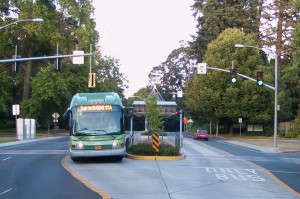While the Planning Board, staff, and County are facing down the challenges of retro-fitting bus rapid transit into the suburbs, some transit planners are thinking about the soulfulness of mass transit.
Beyond the engineering and economic calculations, the languge used to describe the service, its frequency and legibility, whether you can eat on a train car or check your email all contribute to how you feel about transit and whether you’re likely to use it.
I am not a frequent Metro user, but when I think about a local trip I consider it an alternative. I usually find it timely and convenient, but am always stymied by figuring the fare. Am I in the peak or peak of the peak? And when will I be coming back? And why do I have to do math while I’m standing there? Quick, how much is $3.65 and $2.85, what bills do I have in my wallet to pay, and is it any wonder I have fare cards tucked into books and coat pockets worth a nickel a piece?
I know, get a smartcard. But here’s where our funny thinking about transit kicks in. I’m willing to carry $25.00 on my EZPass for the rare occasions I travel north of Baltimore, but not on a smartcard for a transit system in my own backyard. Why?
That’s the kind of human factor explored in this article about transit and that’s something to remember about transportation planning. No matter how perfect the system, it’s still used by human beings.

Mary Bradford
Fare structures do make people nuts, and simplifying twith a cheap, easily understandable fare probably helped make Ride-On take off in Montgomery County. But more interesting (to me) is the lesson applied when we started a bus sytem in Yosemite National Park (a park!) to relieve unholy summertime vehicle congestion due to many thousands of campers and cars idling for hours in that beautiful valley: frequency, frequency, frequency! Copying from Disney, it was clear that reliability was the key, or people would never abandon the “sure thing” of their cars. “Free and frequent” was our mantra. Most people had never riden a bus before except a school bus. You must be able to absolutely count on the bus — if you miss one, you know that another would be along in less than five minutes or you could see the next one was right behind it waiting.
I like the distinction you make between efficiency and empathy.